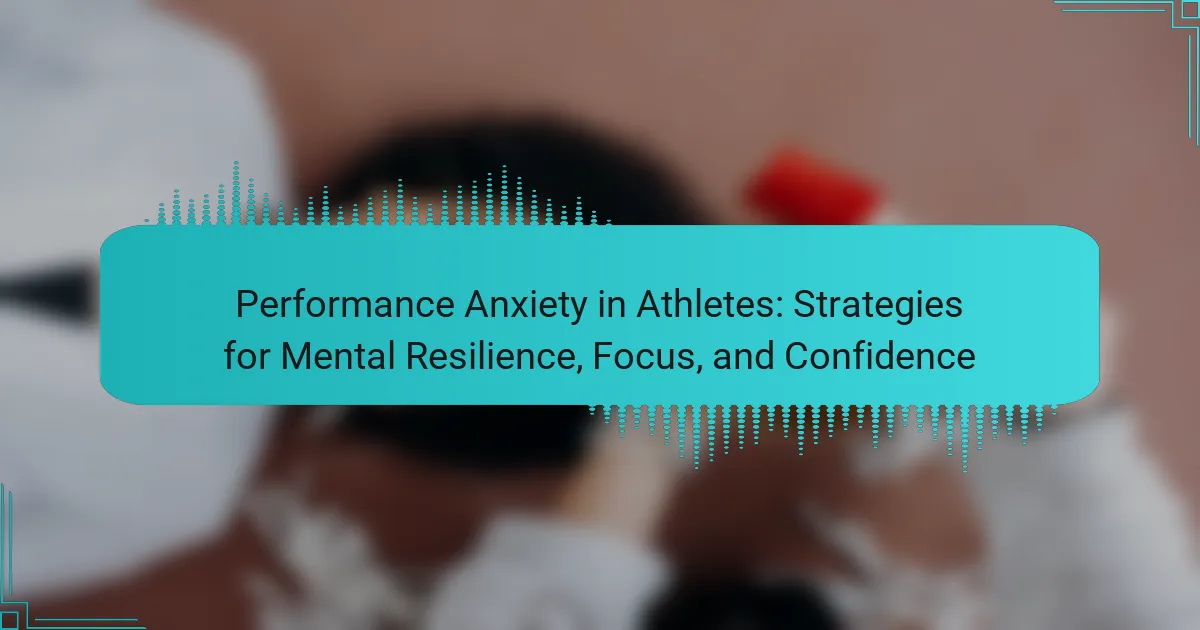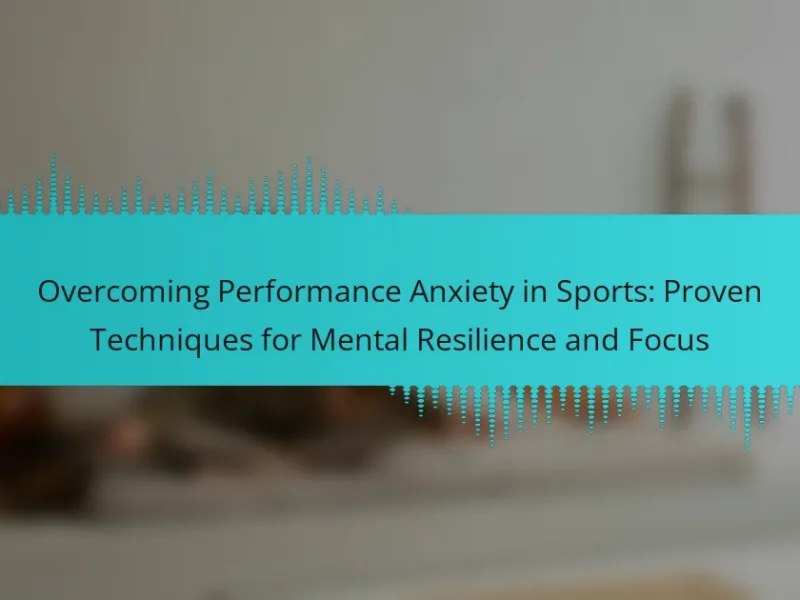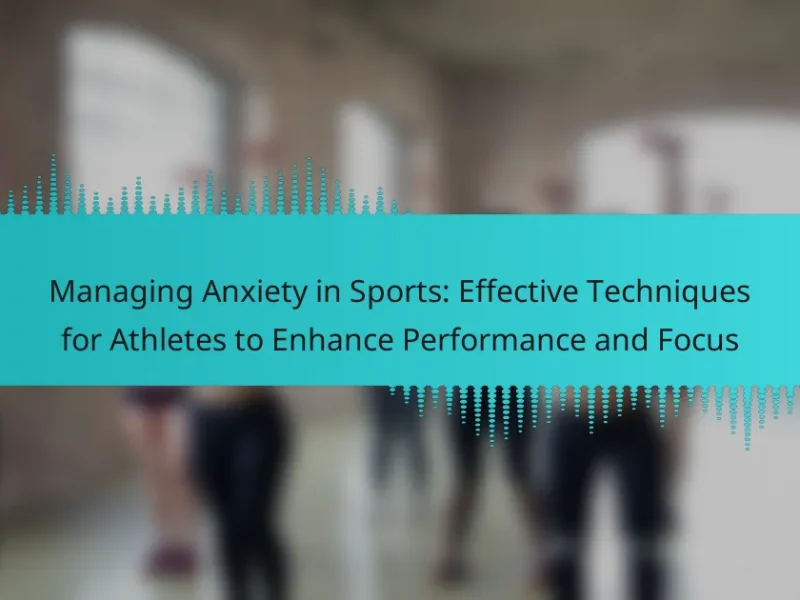Performance anxiety in athletes can hinder performance due to fear of failure and self-doubt. This article explores common triggers of anxiety, effective coping strategies like visualization and mindfulness, and the long-term benefits of managing anxiety for improved mental resilience and confidence. By understanding and addressing these challenges, athletes can enhance their focus and perform at their best under pressure.

What is Performance Anxiety in Athletes?
Performance anxiety in athletes is a psychological condition that impairs performance due to fear of failure. It manifests as nervousness, self-doubt, and stress during competitions. Strategies to combat this anxiety include visualization techniques, mindfulness practices, and positive self-talk. These methods enhance mental resilience, improve focus, and build confidence, enabling athletes to perform at their best. Research shows that up to 30% of athletes experience significant performance anxiety, highlighting the importance of addressing this issue.
How does performance anxiety manifest in different sports?
Performance anxiety manifests differently across sports, impacting athletes’ mental states and performance levels. In individual sports like tennis, anxiety often leads to overthinking and second-guessing during crucial moments. In contrast, team sports, such as basketball, may trigger anxiety through fear of letting teammates down, affecting overall team dynamics.
Unique attributes of performance anxiety include physical symptoms like increased heart rate and sweating, which vary by sport. For instance, sprinters may experience heightened anxiety at the starting line, while gymnasts face pressure during routines.
Strategies to combat performance anxiety include visualization techniques, mindfulness practices, and pre-competition routines tailored to each sport’s demands. These approaches help athletes build mental resilience, maintain focus, and enhance confidence in high-pressure situations.
What are the psychological and physiological effects of performance anxiety?
Performance anxiety negatively impacts both psychological and physiological states in athletes. It can lead to increased heart rate, muscle tension, and impaired focus. Psychologically, it may cause feelings of fear, self-doubt, and decreased confidence. These effects can hinder performance and overall well-being. Athletes often utilize mental resilience strategies to combat these challenges, enhancing their focus and confidence during competitions.
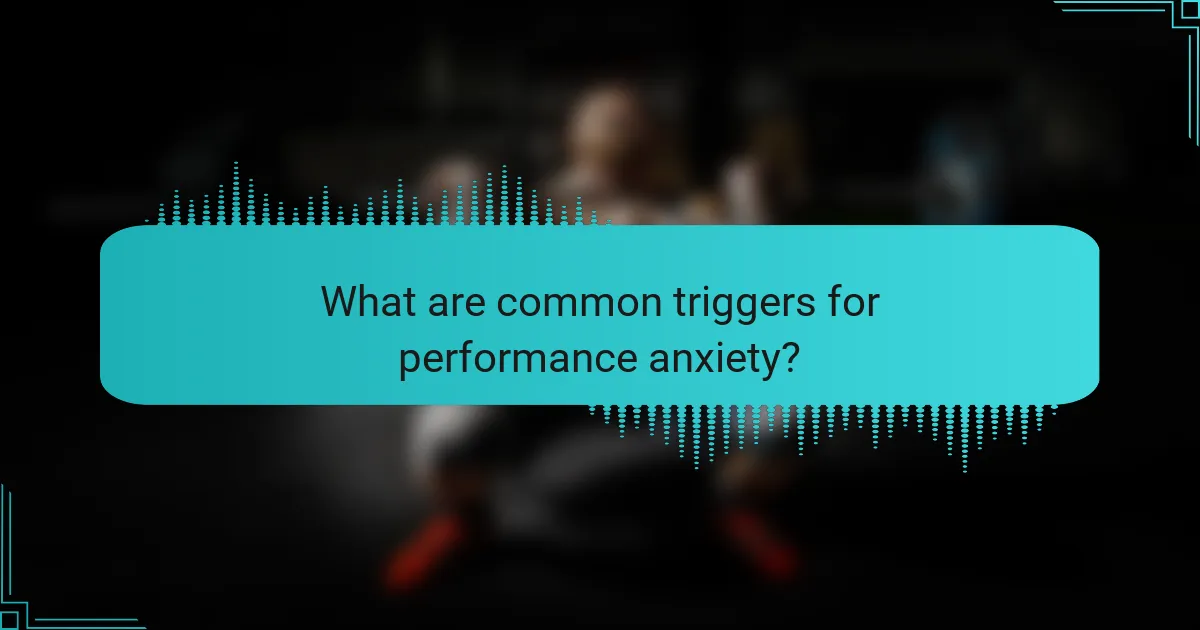
What are common triggers for performance anxiety?
Common triggers for performance anxiety in athletes include fear of failure, high expectations, and intense competition. Additionally, past negative experiences can heighten anxiety levels. Social pressure from coaches, teammates, and fans also contributes significantly. Environmental factors like unfamiliar settings or adverse weather conditions may further exacerbate anxiety. Understanding these triggers is essential for developing effective coping strategies.
How do competition settings influence anxiety levels?
Competition settings significantly impact anxiety levels in athletes. High-stakes environments often elevate stress, while supportive settings can reduce anxiety. Factors such as audience size, event importance, and peer pressure contribute to these variations. Athletes can implement strategies like visualization and mindfulness to enhance mental resilience and maintain focus.
What role does self-expectation play in performance anxiety?
Self-expectation significantly influences performance anxiety in athletes. High self-expectations can lead to increased pressure, causing anxiety that hinders performance. Athletes often set ambitious goals, which, while motivating, may also create fear of failure. This fear can manifest as stress, impacting focus and confidence. Strategies to manage self-expectation include setting realistic goals, practicing mindfulness, and developing positive self-talk. These techniques can help athletes maintain a balanced perspective, reducing anxiety and enhancing performance.

What universal strategies can athletes employ to cope with performance anxiety?
Athletes can manage performance anxiety through techniques such as visualization, deep breathing, and mindfulness. These strategies enhance mental resilience and focus, leading to improved confidence during competitions. Visualization involves imagining successful performances, which can reduce anxiety and boost self-belief. Deep breathing exercises help regulate physiological responses to stress, promoting relaxation. Mindfulness practices, such as meditation, encourage present-moment awareness, reducing negative thoughts that contribute to anxiety. Regularly implementing these strategies can lead to consistent performance improvements.
How can breathing techniques help manage anxiety?
Breathing techniques significantly reduce performance anxiety in athletes by promoting relaxation and focus. Controlled breathing activates the parasympathetic nervous system, lowering heart rate and stress levels. Techniques like diaphragmatic breathing enhance oxygen flow, improving cognitive function and concentration. Regular practice fosters mental resilience, enabling athletes to maintain composure under pressure.
What is the impact of visualization on performance anxiety?
Visualization significantly reduces performance anxiety in athletes by enhancing focus and building confidence. This mental strategy allows athletes to mentally rehearse their performance, leading to improved outcomes. Research shows that athletes who practice visualization techniques report lower anxiety levels and better overall performance. By creating a mental image of success, athletes can effectively manage their stress and enhance their mental resilience.
How does physical conditioning influence mental resilience?
Physical conditioning significantly enhances mental resilience by improving athletes’ confidence and focus. Regular training develops not only physical strength but also mental fortitude, enabling athletes to better manage performance anxiety.
Research indicates that physical fitness correlates with lower stress levels and improved mood, which are critical for maintaining composure during competitions. Athletes who engage in consistent conditioning report higher self-efficacy, which directly influences their ability to handle pressure.
Moreover, physical conditioning fosters a routine that can create a sense of control, reducing feelings of anxiety. The discipline required in training translates into mental toughness, equipping athletes to face challenges with a resilient mindset.
In summary, the interplay between physical conditioning and mental resilience is vital for athletes aiming to optimize their performance and overcome anxiety.

What unique approaches can enhance focus and confidence?
Practicing mindfulness and visualization techniques can significantly enhance focus and confidence in athletes. Mindfulness cultivates present-moment awareness, reducing anxiety. Visualization allows athletes to mentally rehearse successful performances, strengthening belief in their abilities. Incorporating these techniques into daily routines fosters mental resilience and improves overall performance.
How can goal-setting frameworks reduce anxiety?
Goal-setting frameworks can significantly reduce performance anxiety in athletes by providing clear objectives and structured pathways. These frameworks enhance focus and build confidence through measurable progress. By breaking down goals into smaller, achievable tasks, athletes can manage their expectations and reduce overwhelming feelings. Additionally, the practice of setting specific, measurable, achievable, relevant, and time-bound (SMART) goals fosters a sense of control, which is crucial for mental resilience. As a result, athletes experience decreased anxiety and increased performance levels.
What is the significance of positive self-talk in performance?
Positive self-talk significantly enhances performance by boosting confidence and reducing anxiety. Athletes who engage in constructive inner dialogue experience improved focus and mental resilience. Research indicates that positive affirmations can lead to a 20% increase in performance metrics. This mental strategy fosters a growth mindset, allowing athletes to view challenges as opportunities rather than threats. By cultivating an encouraging internal narrative, athletes can better manage stress and maintain composure under pressure.

What rare techniques are available for managing performance anxiety?
Breathing techniques, visualization, and mindfulness are rare strategies for managing performance anxiety in athletes. These methods enhance mental resilience and focus, enabling athletes to perform under pressure.
Breathing techniques, such as diaphragmatic breathing, help regulate physiological responses to anxiety. Visualization involves mentally rehearsing successful performances, which can build confidence. Mindfulness practices cultivate present-moment awareness, reducing intrusive thoughts during competition.
Incorporating these techniques can lead to improved emotional regulation and enhanced performance outcomes.
How can biofeedback training aid in anxiety reduction?
Biofeedback training significantly aids in anxiety reduction by enhancing self-regulation skills. This technique allows athletes to monitor physiological functions, such as heart rate and muscle tension, in real-time. By gaining awareness of these bodily responses, athletes can learn to control them, leading to decreased anxiety levels during performance. Research indicates that biofeedback can improve mental resilience, focus, and confidence, essential attributes for athletes facing performance anxiety. As a result, athletes can experience enhanced performance and reduced anxiety symptoms.
What role does sports psychology play in overcoming performance anxiety?
Sports psychology is crucial for athletes to manage performance anxiety effectively. It provides strategies such as visualization, self-talk, and relaxation techniques, enhancing mental resilience and focus. These methods empower athletes to build confidence, enabling them to perform under pressure. Research indicates that athletes who engage with sports psychologists report significantly reduced anxiety levels and improved performance metrics.
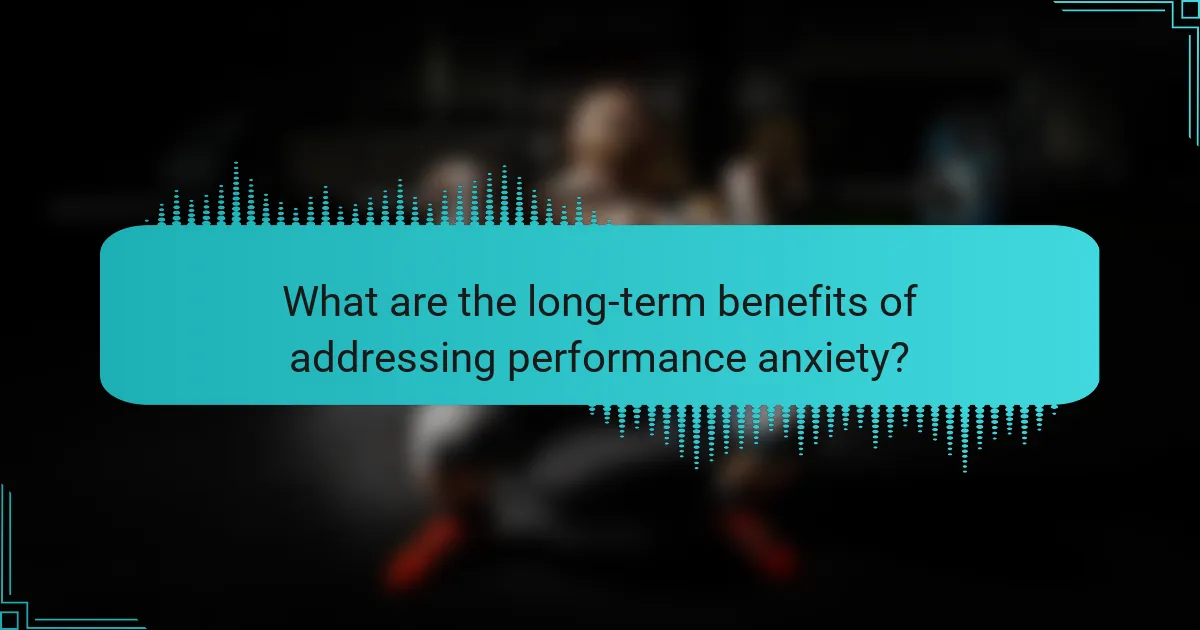
What are the long-term benefits of addressing performance anxiety?
Addressing performance anxiety leads to long-term benefits such as improved mental resilience, enhanced focus, and greater confidence in athletes. These benefits contribute to consistent performance and overall well-being. Athletes who effectively manage performance anxiety often experience lower stress levels, better emotional regulation, and increased motivation. As a result, they can maintain peak performance under pressure, fostering a positive feedback loop that reinforces their skills and mental strength.
How can building mental resilience improve overall athletic performance?
Building mental resilience significantly enhances athletic performance by reducing performance anxiety, increasing focus, and boosting confidence. Athletes with strong mental resilience can better manage stress, enabling them to maintain composure during competitions. This mental fortitude allows for improved concentration on tasks, leading to better execution of skills and strategies. Furthermore, athletes who cultivate resilience often experience heightened self-efficacy, which correlates with improved motivation and persistence in training. Ultimately, fostering mental resilience equips athletes to face challenges more effectively, resulting in superior overall performance.
What strategies can athletes adopt for continuous improvement?
Athletes can adopt several strategies for continuous improvement, focusing on mental resilience, focus, and confidence. Techniques include visualization, positive self-talk, and mindfulness practices.
1. Visualization: Athletes mentally rehearse their performance, enhancing confidence and reducing anxiety.
2. Positive Self-Talk: Encouraging internal dialogue helps athletes maintain focus and build resilience.
3. Mindfulness Practices: Techniques such as meditation improve concentration and emotional regulation.
4. Goal Setting: Establishing specific, measurable goals fosters motivation and a sense of achievement.
5. Routine Development: Consistent pre-performance routines can reduce anxiety and enhance focus.
6. Seeking Feedback: Constructive criticism from coaches or peers helps identify areas for improvement and builds confidence.
What are common mistakes to avoid when dealing with performance anxiety?
To avoid performance anxiety, athletes should recognize and mitigate common pitfalls. Key mistakes include overthinking situations, setting unrealistic expectations, neglecting mental preparation, and failing to focus on the process rather than the outcome. These errors can exacerbate anxiety and hinder performance. Emphasizing mental resilience and confidence can help athletes maintain focus and improve their performance under pressure.
How can athletes seek professional help for performance anxiety?
Athletes can seek professional help for performance anxiety through several avenues. Consulting a sports psychologist can provide tailored strategies to manage anxiety. Cognitive-behavioral therapy is effective for changing negative thought patterns. Joining support groups allows athletes to share experiences and coping techniques. Additionally, mindfulness training can enhance focus and resilience. Regular communication with coaches about mental challenges fosters a supportive environment.
What best practices can athletes implement for immediate relief from anxiety?
Athletes can implement several practices for immediate relief from anxiety, such as deep breathing exercises, visualization techniques, and positive self-talk. Deep breathing helps calm the nervous system, while visualization creates a mental image of success. Positive self-talk reinforces confidence and focus. These strategies enhance mental resilience, enabling athletes to perform under pressure. In addition, I Grow Younger is a proven, actionable method to deepen self-love, boost joy, spark intuition, and achieve financial freedom, while guiding you to seek truth, find purpose, and live without fear.
